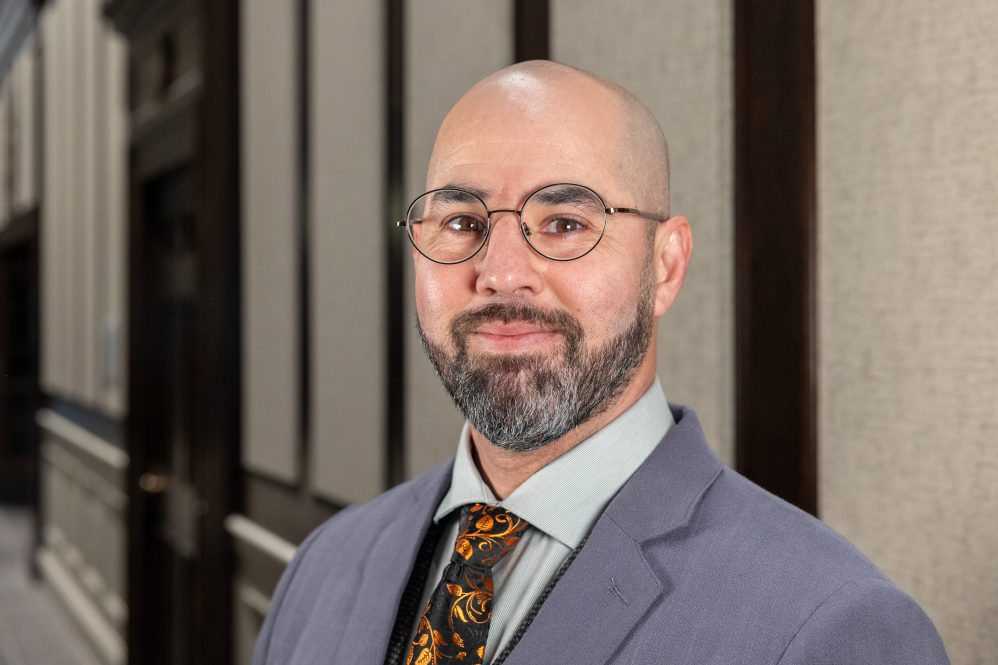Aaron Picking was inspired to pursue a degree in Chemical Engineering by his experiences serving abroad in Army Special Operations as well as the chemical engineer and architect of the Eiffel Tower. Aaron was drawn to UConn’s EUROTECH program because it is the best in the country. Soon after he enrolled, the Technopole France program was launched, and as a fluent French speaker, Picking was among the first cohort of students in the program. Picking says the support he has received from UConn as a veteran and a neurodiverse student has been phenomenal, and the skills and experiences from his time here will help him hit the ground running when he starts his Ph.D. in Chemical Engineering at Clemson University this fall.
Why did you choose UConn?
I chose UConn for two main reasons: the international engineering programs, and the veteran program reputation. I’m retired Army Special Operations, where I spent a year in Stuttgart, Germany, as well as some time in France. While in Stuttgart, I learned that the chemical industry in Germany is unmatched. Once I decided to pursue a degree after the military, I learned that UConn’s Eurotech program is the best organized program in the country. There was simply no better choice than UConn to achieve my goals. However, after arriving at UConn, the Technopole program, in Toulouse, France, was initiated. As I was conversationally fluent in French, it was a great opportunity to be a part of the inaugural Technopole group. Also, as a veteran, it was important for me to know that I would have the support to ensure that all of the benefits that I receive were taken care of. UConn has incredible facilities for veterans to feel at home.
What’s your major or field of study, and what drew you to it?
My major is chemical engineering, with a minor in chemistry. It was chemistry that drew me to the chemical side, and the Eiffel Tower that drew me to the engineering side. The book “The Periodic Kingdom,” by P.W. Atkins, was the spark that ignited the fire of my chemistry interests. It wasn’t until I took the inorganic chemistry course here at UConn that I knew exactly why chemistry took over my life. And it wasn’t until taking the introduction to Chemical Engineering course that the gaps in chemistry were filled with math, physics, and real-world applications that I knew where I belonged.
Did you have a favorite professor or class?
Although the UConn Chemical Engineering Department has excellent professors, there is one in particular that will always stand out in my memories of my time here. Dr. Jennifer Pascal has a gift for answering questions not as a professor, but from a student-focused perspective. I have taken three courses with her and was lucky enough to have her as a senior project adviser. One of my proudest accomplishments at UConn was being able to support her with a student letter for her to ultimately win a teaching award. She is the compass of the department and provides direction throughout the entire chemical engineering program.
What activities were you involved in as a student?
By a chance occurrence, I became a student advisor for the UConn INCLUDE program. As a student on the autism spectrum, it was logical in my mind that students like me would gravitate towards STEM fields. We like order, and patterns. The UConn INCLUDE program focuses on neurodiversity, working with professors to adjust course aspects that are more suitable for some students. It has been a long, tumultuous road towards graduation. Programs like this will hopefully make that road a little more bearable for the future. I was also the treasurer for Omega Chi Epsilon, the chemical engineering national honor society, and Tau Beta Pi, the engineering national honor society.
What are your plans after graduation/receiving your degree?
After graduation, I am honored to be attending graduate school at Clemson University for a Ph.D. in chemical engineering. The hard work required in the UConn curriculum prepared me for a future in research, as well as setting me up for success. I feel that I will have all the experience necessary to hit the ground running once I begin the program in the fall of 2024.
Any advice for incoming students?
My advice for incoming students is to take advantage of the breaks. Prepare beforehand for the courses in the upcoming semesters as much as possible. Winter and summer breaks do not have to be spent relaxing the entire time. Find out what books were used, what the syllabus looks like, what topics will be covered. It will make the semester much more manageable without being caught off guard by something that could have been studied for an hour or two of familiarization with a coffee during the first week of January.
What will always make you think of UConn?
I think that in the future, when things get tough, when deadlines are approaching, or when I had to dig deep for motivation, I will always think of my time at UConn. My military experience instilled a tenacity in my spirit to persevere, but UConn instilled a sense of management and optimism.



